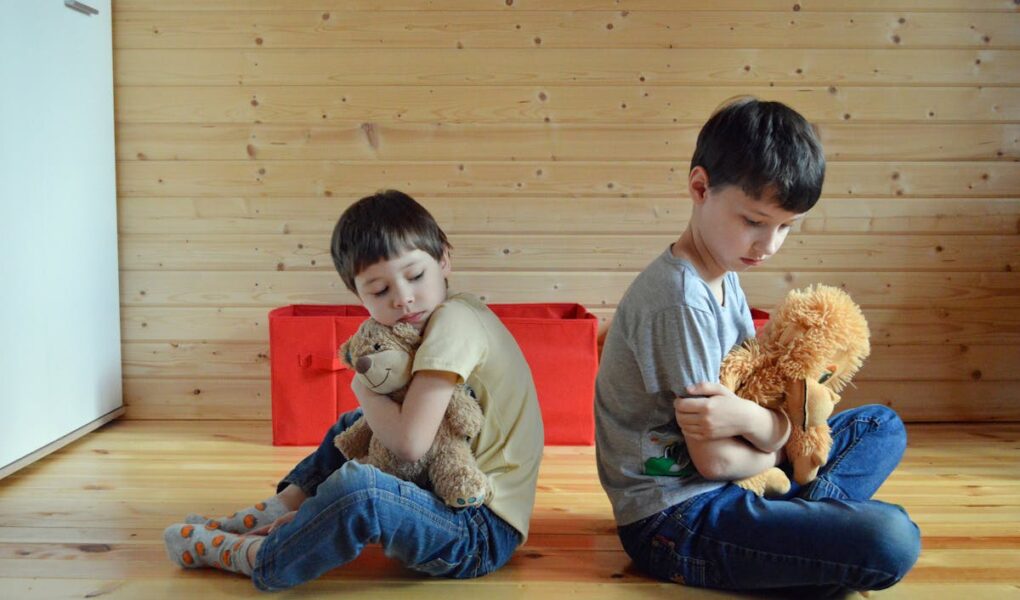Every parent wishes that their kids get along and develop a close sibling relationship. Some kids take to their siblings right away, while others might struggle even being in the same room together.
If the siblings struggle to connect, it can be exasperating for them to be “stuck” with a brother or sister that they do not get along with. At the same time, it can be worrisome and stressful for the parents to see their children constantly arguing and at odds.
This is why it’s always better to take preventive measures early on, to ensure that our children develop a healthy relationship that will allow them to have a close bond. If you are currently struggling with your kids not seeing eye to eye, it’s never too late to begin to implement new strategies to help your children strengthen their sibling bond.
Here are 8 things you can do to encourage a healthy sibling relationship
1. Teach them to communicate
Teach them how to speak to each other with respect and love. They are siblings and they will always be connected by their bond. In order for them to stay together into adulthood, they need to be able to treat each other with love, while at the same time, respecting the boundaries that they have set for themselves.
In order to achieve this, they need to know how to communicate with one another. They should be able to speak their minds and have a conversation when something is bothering them.
They also need to learn how to support one another, as well as encouraging each other when something has been well done.
2. Teach them to apologize
They could be the most loving pair of siblings to ever walk the earth, even so, they will still have arguments and disagreements. This is completely normal.
It is during these times that they need to be able to sit down and express how each other is feeling. Instill in them, starting at their youth, to apologize to their sibling when one has done something to upset the other. While at the same time to apologize for their part in escalating the altercation, even if they didn’t start the argument.
This has a lot of benefits for their sibling relationship. Taking accountability and apologizing for their actions, will repair their relationship and strengthen their bond. It will also benefit them in all of their future relationships.
Your children will be cultivating healthy communication skills and learning the importance of taking accountability for their actions.
3. Teach them to accept an apology

Believe it or not, this is a skill. It can be hard to accept an apology appropriately. If the person receiving the apology is still angry, they may want to be excessively mean to the one offering it. It may make them feel superior and want to punish the offender. Or they might just want to completely ignore the person that is trying to make it right.
When our emotions are high, it can be difficult to listen to someone trying to sincerely offer an apology. Now imagine how much more difficult it is for kids that are still learning to regulate their feelings and emotions. It is at this time when parents might need to step in and guide their children into making peace.
You could say something like this:
“Timmy, I know that you are upset because of what happened. There is nothing wrong with feeling angry. Your brother realizes that he should not have done that and is trying to apologize. How about we talk this out”.
Allow each child to explain their point of view and help them clarify their actions. Sometimes their disagreement might be due to a misunderstanding. However, in the event that it was due to naughty behavior, make sure due apologies are given. Do your best to remain neutral but firm.
4. Encourage them to show each other affection
It could be in the form of kisses, hugs, kind words, or saying I love you. The point is to teach them that showing affection is a way to show that you care for a person. Teach them that this is not a weakness and that there is nothing wrong in loving your brother or sister. It is a beautiful thing when siblings have a close relationship where they can rely and have deep trust in one another.
The day will inevitably come when you will no longer be around, and they will be the only ones left. Nurture that bond and help them build the tools they need to remain close for a lifetime.
Learning how to have a healthy relationship starts at home. Even if your upbringing did not include an affectionate environment, do your best to model affectionate actions to your kids. When we make sure that our kids are receiving love and affection, it creates the perfect environment for raising confident, well-adjusted, happy kids. In turn, they will emulate your actions with the people around them. This will be evident in the way that they will interact with their siblings.
5. Have zero tolerance for violence
There should be, under no circumstances, any room for physical violence in your home. No one should be putting their hands on each other, regardless of the reason.
Fighting will happen no matter what you do. But it shouldn’t be a regular occurrence and the violence shouldn’t be uncontrolled. If your children are punching, biting, slapping, and kicking each other, then they need to face serious consequences.
Children need to know that they cannot hurt their brother or sister (or anyone else for that matter). Even if they have a disagreement, it is not ok to fight.
When I was little, my brother and I would get into fights at times. My mom would punish us by making us hug each other for a while. It felt like an eternity! Lol. But it taught me that I should stay close to my brother rather than fighting him.
Now, I do the same with my kids. When their arguments escalate to a fight, their punishment is to talk to each other to discuss what happened, followed by a hug and kiss, and resulting in them hugging each other for a while. By the time I tell them they can let go, they are already joking with each other and have made up.
6. Encourage them to play together

Always encourage your children to play together. Whether it is board games, tag, or a make-believe game. Children bond while playing, and create fond memories that they will always carry in their hearts.
For kids, playing is the primary avenue for forming friendships and connections. This is how they get to know each other and learn what their interests are. By encouraging play, you will be setting the stage for the development and strengthening of their sibling bond.
7. Organize fun activities that they can enjoy together
Organize fun activities to do together. Not only will it be great for them, but for you as well. Spending time together as a family and laughing together will bring you closer.
Here are some ideas you can try:
Free
- Go to the park
- Go to the playground
- Go on hikes
- Explore a nearby pond, river, beach, or any other body of water. Try to spot little critters.
- Star gaze (To make it more interesting, try to find constellations and/or any planets visible with the naked eye)
- Go to the library
- Organize a family movie night at home
- Visit a lighthouse
- Go to the beach (some beaches are free. Check before you go)
- Go to a lake (some lakes are free. Check before you go)
More ideas
- Go to a museum
- Go to the Zoo
- Go to the Aquarium
- Visit a Science Center
- Go to the movie theater
- Go to the beach
- Got to the pool
- Go to the lake
Ask your kids what things they are interested in and take things from there. The goal is to do something that the whole family can enjoy. While at the same time, creating an opportunity for the siblings to connect.
8. Don’t play favorites
This is one of the most important things you need to make sure of. Do not play favorites with your kids. This will create a hostile environment for your children. It may create resentment and competition.
Realizing that one sibling is the favorite, is one of the main reasons why siblings do not get along. It creates sibling rivalry and unhealthy relationships.
Do your best to treat your children equally, showing them love, and being fair. Don’t encourage competition amongst each other. Instead, teach them to cheer on their sibling’s accomplishments and be happy for them.
Related post: This Is What Happens When You Have a Favorite Child.
To wrap up

As a parent, I understand how important it is for us that our children get along and that they build a strong relationship.
This is why we need to remember that it’s our job to set the stage and build the foundation for our children to follow. It can sometimes be challenging to get your children to get along, but it’s not impossible. We don’t know how things will turn out once they grow up, but if we build a strong enough foundation, the chances are that they will remain close for a lifetime.





[…] Related Post: How To Make Sure Our Kids Get Along. […]